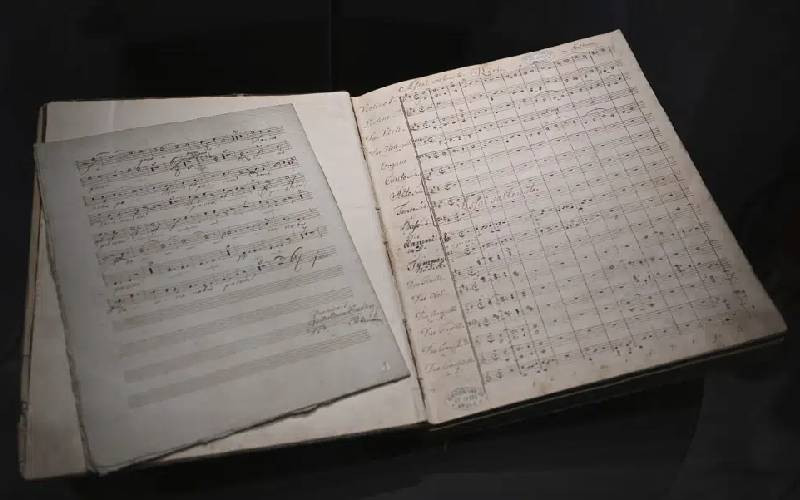
A Ludwig van Beethoven's music manuscript, is seen in the Moravian Museum's collection in Brno on Nov. 30 2022, in Brno, Slovakia. [AP Photo]
A musical manuscript handwritten by Ludwig van Beethoven is getting returned to the heirs of the richest family in pre-World War II Czechoslovakia, whose members had to flee the country to escape the Holocaust.
The Moravian Museum in the Czech city of Brno has had the original manuscript for the fourth movement of Beethoven's String Quartet n B-flat Major, Op. 130 in its collection for more than 80 years. The museum put the score on display for the first time this week in anticipation of handing it over to its rightful owners.
"It's one of the most precious items in our collections," museum curator Simona Sindelarova said.
The museum said a restitution law on property stolen by German Nazis made the return possible. Details about how the family, whose wealth came mainly from mining industry and banking in Central Europe, after World War I acquired the piece from one of the German composer's late quartets is unknown.
"We're sorry about losing it, but it rightly belongs to the Petschek family," Sindelarova said.
Beethoven composed the six-movement String Quartet in B-flat Major in 1825 -1826 as part of his work on a series of quartets commissioned by Russian Prince Nicholas Galitzin. It premiered in March 1826 at the Musikverein concert hall in Vienna, Austria.
Museums, archives and libraries in the Czech Republic, France, Germany, Poland and the United States currently have almost 300 pages of the entire autograph in their possession.
It's known that Beethoven, who died in 1827, gave the fourth movement to his secretary, Karl Holz, and at least two other private owners in Vienna acquired it before the Petscheks.
The family tried but failed to send the manuscript abroad by mail in March 1939 during the Nazi occupation of Czechoslovakia, drawing the attention of the Gestapo.
According to Sindelarova, the Germans asked an expert from the Moravian Museum at the time to verify Beethoven had penned the document, and "he denied that in an effort to save it" from the occupiers.
The lie could have cost him dearly, but it worked; the museum was allowed to keep the piece. However, the Nazis seized most of the Petschek family's assets and possessions, which Czechoslovakia's Communist regime nationalized after the war.
From his new home in the United States, Franz Petschek, who had run the family's mining businesses in Czechoslovakia, tried to get the piece back but was unsuccessful due to the post-war division in Europe and creation of the Iron Curtain.
The Moravian Museum signed a deal on Aug. 3 to transfer the ownership of the manuscript to his heirs. However, other families with claims to property and valuable items lost during World War II are still waiting for their cases to be resolved.
Anne Webber, the co-chair of the London-based Commission for Looted Art in Europe, said that despite 47 countries agreeing in 2009 to try to resolve Holocaust-era injustices, "the restitution of artworks that were looted often seems to be as distant prospect as ever."
"Some 90% of all artworks being sought today by families have been neither found nor returned," Webber said at a conference held in Prague last month to review the progress made since the non-binding Terezin Declaration was adopted.
The declaration urged governments to make every effort to return former Jewish communal and religious property confiscated by the Nazis, fascists and their collaborators, and recommended that countries implement programs to address the issue of private buildings and land.
 The Standard Group Plc is a multi-media organization with investments in media
platforms spanning newspaper print
operations, television, radio broadcasting, digital and online services. The
Standard Group is recognized as a
leading multi-media house in Kenya with a key influence in matters of national and
international interest.
The Standard Group Plc is a multi-media organization with investments in media
platforms spanning newspaper print
operations, television, radio broadcasting, digital and online services. The
Standard Group is recognized as a
leading multi-media house in Kenya with a key influence in matters of national and
international interest.
